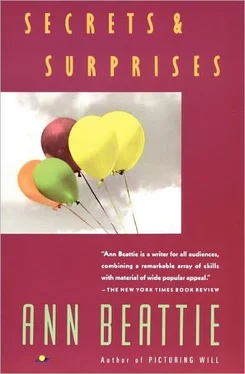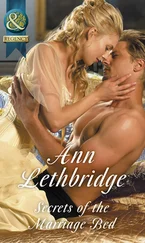“Nothing happened to them,” Lenore says. Julie turns around and Lenore catches that small point of light in her eye again. “Maybe they took shelter under a tree,” she says. “Maybe they’re screwing. How should I know?”
It is not a word Lenore often uses. She usually tries not to think about that at all, but she can sense that Julie is very upset.
“Really?” Julie says. “Don’t you care, Mrs. Anderson?”
Lenore is amused. There’s a switch. All the students call her husband George and her Lenore; now one of them wants to think there’s a real adult here to explain all this to her.
“What am I going to do?” Lenore says. She shrugs. Julie does not answer.
“Would you like me to pour you tea?” Lenore asks.
“Yes,” Julie says. “Please.”
George and Sarah return in the middle of the afternoon. George says that they decided to go on a spree to the big city — it is really a small town he is talking about, but calling it the big city gives him an opportunity to speak ironically. They sat in a restaurant bar, waiting for the rain to stop, George says, and then they thumbed a ride home. “But I’m completely sober,” George says, turning for the first time to Sarah. “What about you?” He is all smiles. Sarah lets him down. She looks embarrassed. Her eyes meet Lenore’s quickly, and jump to Julie. The two girls stare at each other, and Lenore, left with only George to look at, looks at the fire and then gets up to pile on another log.
Gradually it becomes clear that they are trapped together by the rain. Maria undresses her paper doll and deliberately rips a feather off its hat. Then she takes the pieces to Lenore, almost in tears. The baby cries, and Lenore takes him off the sofa, where he has been sleeping under his yellow blanket, and props him in the space between her legs as she leans back on her elbows to watch the fire. It’s her fire, and she has the excuse of presiding over it.
“How’s my boy?” George says. The baby looks, and looks away.
It gets dark early, because of the rain. At four-thirty George uncorks a bottle of Beaujolais and brings it into the living room, with four glasses pressed against his chest with his free arm. Julie rises nervously to extract the glasses, thanking him too profusely for the wine. She gives a glass to Sarah without looking at her.
They sit in a semicircle in front of the fire and drink the wine. Julie leafs through magazines— New Times, National Geographic —and Sarah holds a small white dish painted with gray-green leaves that she has taken from the coffee table; the dish contains a few shells and some acorn caps, a polished stone or two, and Sarah lets these objects run through her fingers. There are several such dishes in the house, assembled by George. He and Lenore gathered the shells long ago, the first time they went away together, at a beach in North Carolina. But the acorn caps, the shiny turquoise and amethyst stones — those are there, she knows, because George likes the effect they have on visitors; it is an expected unconventionally, really. He has also acquired a few small framed pictures, which he points out to guests who are more important than worshipful students — tiny oil paintings of fruit, prints with small details from the unicorn tapestries. He pretends to like small, elegant things. Actually, when they visit museums in New York he goes first to El Grecos and big Mark Rothko canvases. She could never get him to admit that what he said or did was sometimes false. Once, long ago, when he asked if he was still the man of her dreams, she said, “We don’t get along well anymore.” “Don’t talk about it,” he said — no denial, no protest. At best, she could say things and get away with them; she could never get him to continue such a conversation.
At the dinner table, lit with white candles burning in empty wine bottles, they eat off his grandmother’s small flowery plates. Lenore looks out a window and sees, very faintly in the dark, their huge oak tree. The rain has stopped. A few stars have come out, and there are glints on the wet branches. The oak tree grows very close to the window. George loved it when her brother once suggested that some of the bushes and trees should be pruned away from the house so it would not always be so dark inside; it gave him a chance to rave about the beauty of nature, to say that he would never tamper with it. “It’s like a tomb in here all day,” her brother had said. Since moving here, George has learned the names of almost all the things that are growing on the land: he can point out abelia bushes, spirea, laurels. He subscribes to National Geographic (although she rarely sees him looking at it). He is at last in touch, he says, being in the country puts him in touch. He is saying it now to Sarah, who has put down her ivory-handled fork to listen to him. He gets up to change the record. Side two of the Telemann record begins softly.
Sarah is still very much on guard with Lenore; she makes polite conversation with her quickly when George is out of the room. “You people are so wonderful,” she says. “I wish my parents could be like you.”
“George would be pleased to hear that,” Lenore says, lifting a small piece of pasta to her lips.
When George is seated again, Sarah, anxious to please, tells him, “If only my. father could be like you.”
“Your father,” George says. “I won’t have that analogy.” He says it pleasantly, but barely disguises his dismay at the comparison.
“I mean, he cares about nothing but business,” the girl stumbles on.
The music, in contrast, grows lovelier.
Lenore goes into the kitchen to get the salad and hears George say, “I simply won’t let you girls leave. Nobody leaves on a Saturday.”
There are polite protests, there are compliments to Lenore on the meal — there is too much talk. Lenore has trouble caring about what’s going on. The food is warm and delicious. She pours more wine and lets them talk.
“Godard, yes, I know … panning that row of honking cars so slowly, that long line of cars stretching on and on.”
She has picked up the end of George’s conversation. His arm slowly waves out over the table, indicating the line of motionless cars in the movie.
“That’s a lovely plant,” Julie says to Lenore.
“It’s Peruvian ivy,” Lenore says. She smiles. She is supposed to smile. She will not offer to hack shoots off her plant for these girls.
Sarah asks for a Dylan record when the Telemann finishes playing. White wax drips onto the wood table. George waits for it to solidify slightly, then scrapes up the little circles and with thumb and index finger flicks them gently toward Sarah. He explains (although she asked for no particular Dylan record) that he has only Dylan before he went electric. And “Planet Waves”—“because it’s so romantic. That’s silly of me, but true.” Sarah smiles at him. Julie smiles at Lenore. Julie is being polite, taking her cues from Sarah, really not understanding what’s going on. Lenore does not smile back. She has done enough to put them at ease. She is tired now, brought down by the music, a full stomach, and again the sounds of rain outside. For dessert there is homemade vanilla ice cream, made by George, with small black vanilla-bean flecks in it. He is still drinking wine, though; another bottle has been opened. He sips wine and then taps his spoon on his ice cream, looking at Sarah. Sarah smiles, letting them all see the smile, then sucks the ice cream off her spoon. Julie is missing more and more of what’s going on. Lenore watches as Julie strokes her hand absently on her napkin. She is wearing a thin silver choker and — Lenore notices for the first time — a thin silver ring on the third finger of her right hand.
Читать дальше












